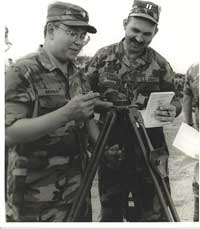 (The following is a guest post by Dr. Kuni Beasley. ROTC scholarships offer more money than most National Merit Scholarships and can be used at more institutions.)
(The following is a guest post by Dr. Kuni Beasley. ROTC scholarships offer more money than most National Merit Scholarships and can be used at more institutions.)
Most people do not know about ROTC scholarships. Indeed, most high school counselors and most professional consultants know little about them… if at all. The Army, Navy (includes Marines), and Air Force provide ROTC scholarships to students to attend civilian colleges and become commissioned officers. Over 1100 colleges have ROTC, from Harvard to Berkeley to the Northern Marianas College to the University of Alaska – Fairbanks.
I attended Texas Christian University (TCU) on a four-year Army ROTC scholarship. I would not have been able to attend college, much less an expensive private college, without that scholarship. The ROTC scholarship paid full tuition, books, fees, and gave me $100 a month… which was a lot of money in 1972! I had to pay for my dorm and my meals, which cost a lot less than it would if I lived at home.
Join other parents in the Coffee Cup College Planning Facebook Group
Best Scholarship in the Nation
In my opinion, ROTC scholarships are the best scholarships in the county. They are portable – which means the scholarship can be used at any college that has ROTC – which is just about every major college in the country. If you are awarded an ROTC scholarship, not only will you be able to pay for college, you will have some of the top institutions in the nation from which to choose.
Here’s what you get with an ROTC scholarship:
Tuition, Fees, and Books. Actual amounts vary. Army pays full tuition, fees, and books. Navy pays full tuition and fees but provides a stipend for books. Air Force has three types of scholarships that pay: 1) full tuition, most fees, and $900 for books, 2) tuition up to $18,000 per year, and $900 for books, and 3) In-state tuition and $900 for books.
Monthly Stipend. $250 – $500 a month depending on branch and year in college.
You will, however, have to get admitted like everyone else. However… and a BIG HOWEVER… many colleges will admit you automatically when they learn you have an ROTC scholarship. Indeed, some will actually pursue you, and many will offer incentives such as free room and board, additional funding, special privileges, and other inducements because they know that the government will pay the retail price for college, and you have a first-class ticket! Institutions like TCU and the University of Southern California – relatively expensive colleges – offer free room and board if you have an ROTC scholarship.
High profile universities like Harvard, Yale, and most Ivy League colleges offer ROTC, along with Stanford, MIT, Tufts, Berkeley, Duke, Georgetown, Bucknell, and Johns Hopkins. Most of these institutions do not offer regular scholarships, but if you get admitted, you’re bringing your own scholarship with you.
ROTC In College
Now… for the rest of the story. You are required to participate in ROTC. Participation varies by institution. Some institutions like Texas A&M and Virginia Tech have a formal Corps of Cadets who live in a kind of “military school” within the University. Cadets wear uniforms every day, march to class, eat in dining halls, and live in dorms similar to the military academies such as West Point and Annapolis.
Others – like I had at TCU – are less formal. We attended ROTC class just like any other academic class and had a couple of hours of drill and military training in uniform once a week, plus an occasional weekend activity.
There are also the non-federal military academies: The Citadel and Virginia Military Institute, four-year military colleges that operate much like the federal service academies. They, too, offer incentives for those who have ROTC scholarships.
At least one summer, and in some cases more than one summer, you attend ROTC camp. You live in barracks (they’ve gotten better since my days) and go through a Boot Camp for Officers.
There are also opportunities for elite training. Army ROTC offered Airborne school, Ranger school, and other specialty training for cadets during the summer. The Navy provides three summer cruises on board ship. You will develop great friendships with your ROTC comrades with whom you will share not only alumni relationships but the shared military experience.
Active Duty Obligation
After graduation, you will have to serve at least four years on active duty. Many people have different opinions about serving in the military, but you need to realize that you will be serving as an officer, a leader, and you will have more leadership experience and more responsibility than any of your civilian peers. Although my original intent was to get my college paid through ROTC, my experience on active duty as a leader and commander has no parallel in civilian life.
I would not trade my military experience for anything. While my peers in the civilian world were getting coffee for their supervisors in the break room, at the age of 23, I commanded a nuclear Field Artillery battery in Germany with 200 soldiers, 18 nuclear weapons, and millions of dollars of equipment under my command. The level of responsibility and leadership at a young age has no parallel in the civilian sector.
Later, I was the Manager of the Officers Advanced Course at Ft. Sill, OK, where I got to work with the latest technology and develop innovative training and learning methods that are still used today.
The Army paid for my Masters Degree while I was on active duty and, when I left active duty and went into the reserves, I used my G. I. Bill to pay for my Ph. D. In the reserves, I trained Drill Sergeants and taught Advanced Officer courses, and even did a tour at the Pentagon, where I reviewed the mobilization plan for Desert Storm. Even in the reserves, there are still plenty of opportunity for leadership and hands-on experience.
I retired out of the reserves and still enjoy military privileges and benefits, and, of course, my veteran’s discounts and my free dinner at Applebee’s every Veteran’s Day. My wife still beams when we visit a military base, and the gate guard snaps to attention and salutes when they see the rank on my military I.D.
Pursuing an ROTC Scholarship
I have helped many students obtain ROTC scholarships. If you are serious about pursuing an ROTC scholarship, here are some tips:
- Unlike those who pursue college scholarships, the military is not necessarily looking for geniuses. They are looking for men and women of courage and character who are willing to learn to lead. Build personal success traits into your life: initiative, responsibility, dependability, reliability, integrity.
- SAT and ACT scores are important, but you don’t have to be a National Merit Scholar to get an ROTC scholarship. Requirements range from 920 SAT, 19 ACT, and 2.5 GPA (Army) to 1100 SAT, 24 ACT, and 3.0 GPA (Air Force). These are qualification scores (and about average for college), so it would do you well to get higher scores because these are competitive. The mean score for the top Air Force scholarship was about 1440 SAT, 33 ACT, and 3.91 GPA.
- Get involved in activities and hold leadership positions. I recommend Boy Scouts and Girl Scouts, Civil Air Patrol (which is actually more military than high school ROTC), Sea Cadets, Young Marines, and similar organizations. Get involved in community service, particularly if it involves veterans.
- Be athletic with team sports, combatives (judo, karate, boxing, marksmanship, archery, wrestling), individual fitness (running, cross country, weight lifting, cycling), and some form of coaching, teaching, or training peers or younger students.
- Get involved and volunteer with veterans organizations like the American Legion, VFW, and Disabled American Veterans, and meet and make friends with the men and women who served. Who knows? One of them might write you a letter of recommendation for the scholarship.
- Visit military installations, local college ROTC detachments, and even local high school ROTC units (you don’t have to be in high school ROTC to pursue a scholarship). I would say visit local military recruiters, but if you do, don’t let them talk you into enlisting before college.
- Visit the ROTC websites (see below) and get an account. You want to get on their radar early, and they will keep you informed. Go through the requirements and the list of colleges that offer that particular branch of ROTC – and, of course, look at the colleges that offer incentives. Go to the website of those colleges to see what you need to get admitted.
Comparative Salaries:
Believe it or not, a military officer receives a very competitive salary. Indeed, military salaries rank in the top five median salaries over the first five years after college and remain in the top 10 at mid-career. A Washington Post article placed military academies very high on starting salaries with Naval Academy and West Point at the top.
You’re probably wondering what West Point and the Naval Academy salaries have to do with ROTC. Military academy graduates and ROTC graduates enter the military at the same rank and get the same pay. The military doesn’t pay service academy graduates more because they went there. The academies provide a good benchmark comparing ROTC graduates with top institutions, regardless of where they went to college.
Websites:
Army ROTC http://www.goarmy.com/rotc.html
Air Force ROTC http://www.afrotc.com/
Navy ROTC http://www.nrotc.navy.mil/index.aspx
Final Thoughts:
Looking back, I have no regrets. Not only did I get my Bachelors degree for free, but I also got my Masters and Ph. D. paid for through the military. I got to experience the challenge of leadership and responsibility at a young age. At a time when most of my peers were sitting in cubicles, I led men who were older than my father. As I look at the ROTC scholarship today, I see few better ways to earn the benefits, gain the privileges, experience the challenges, and enjoy the honor of leading and serving the next generation of American heroes – those who will be serving with you.
 Dr. Kuni Michael Beasley is an internationally recognized expert on college education and preparation. He has helped students gain admissions to the top colleges in the nation (Ivy League, Top Tier, Service Academies, etc.) and his students have earned over $80 million in scholarships and grants since 2011. He was a College Professor for 16 years and has been the Dean of the NEW College Prep Academy (NCPA) since 1996. His College Prep programs have been used by public and private schools in over 20 states. Dr. Beasley earned a BS from Texas Christian University, an MBA from Oklahoma City University, a D. Min. from Tyndale Seminary, and a Ph. D. from the University of Texas – Arlington. He completed 22 years of college and only paid for one semester.
Dr. Kuni Michael Beasley is an internationally recognized expert on college education and preparation. He has helped students gain admissions to the top colleges in the nation (Ivy League, Top Tier, Service Academies, etc.) and his students have earned over $80 million in scholarships and grants since 2011. He was a College Professor for 16 years and has been the Dean of the NEW College Prep Academy (NCPA) since 1996. His College Prep programs have been used by public and private schools in over 20 states. Dr. Beasley earned a BS from Texas Christian University, an MBA from Oklahoma City University, a D. Min. from Tyndale Seminary, and a Ph. D. from the University of Texas – Arlington. He completed 22 years of college and only paid for one semester.
[email protected]
www.BeasleyCollegePrep.com
CONNECT WITH OTHER PARENTS PLANNING FOR COLLEGE
JOIN THE COFFEE CUP COLLEGE PLANNING FACEBOOK GROUP

